Water is the most precious gift of Mother Nature. Over the years, there has been a drastic rise in the world’s human population. Among the many problems that have come along. The indiscriminate use of water has led to extreme scarcity in numerous regions all over the world. This global threat has compelled people to come up with novel and innovative techniques to save water and show a promising path for future generations. One such research, on pervious concrete, has been carried out by Dr.Ravi Kumar Bodasingu, a resident of Vizag.
Ravi Kumar did his M.Tech (Civil), from Jawaharlal Nehru Technological University (JNTU), Kakinada in 2004. Being associated with M/s UltraTech Cement Limited, for over a decade now, he was able to use his knowledge on the properties of concrete, to carry out the required research. He attained a Ph.D in Geo-Engineering Department from Andhra University for his research on the rate of water percolation through pervious concrete on the different types of soils in Vizag. Permeable concrete has a unique advantage of allowing rainwater to percolate down to refill the groundwater levels. Thus, preventing the surface run-off levels after the rains and probably bringing a solution to the looming water crisis that has hit the Visakhapatnam since the summer of 2019.
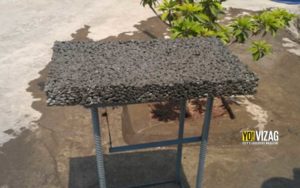
Pervious concrete contains expansive pore spaces and enables water to go through at a faster rate. The said concrete is apparently suitable for parking areas and walkways. For constructing roads, the concrete needs require to be reinforced in order to sustain the weight of the heavy vehicles. This has been implemented in a few European countries like The Netherlands.
“The idea to conduct this research struck me in the aftermath of Cyclone Hudhud. I noticed that everyone was facing water problems due to the lack of power supply to pump the underground water to the overhead tanks. I started to wonder what would happen when the groundwater runs dry. We will not be able to do anything in spite of having electric supply to run our pumps,” he shares.
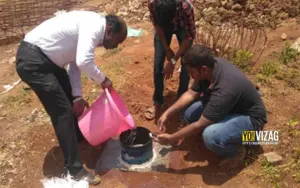 That is when Ravi Kumar decided to research a method to recharge groundwater levels using pervious concrete roads as the medium. He approached Prof.G.Jaisankar, Head of Department of Geo-Engineering, at Andhra University, while pursuing his Ph.D. Once his research topic was approved, Ravi Kumar had done the practicals in the R&D lab at UltraTech Ready Mix Concrete Plant and spent many weeks on field for studying the rate of absorption of rainwater through pervious concrete, on different soils, in Vizag.
That is when Ravi Kumar decided to research a method to recharge groundwater levels using pervious concrete roads as the medium. He approached Prof.G.Jaisankar, Head of Department of Geo-Engineering, at Andhra University, while pursuing his Ph.D. Once his research topic was approved, Ravi Kumar had done the practicals in the R&D lab at UltraTech Ready Mix Concrete Plant and spent many weeks on field for studying the rate of absorption of rainwater through pervious concrete, on different soils, in Vizag.
Ravi further enlightens that some of the materials used to prepare this concrete, such as fly ash and granulated blast furnace slag, are all by-products from industries present in Vizag like National Thermal Power Corporation (NTPC) and the Visakhapatnam Steel Plant (VSP). The disposal of these is costly and it is not environment-friendly.
Ravi Kumar suggests that using these materials, in the production of permeable concrete, would implement the ‘3 Rs’- Reduce, Reuse and Recycle-an effective method to make the environment cleaner.
Additional use of these permeable concrete slabs is under the air conditioning outdoor units in apartment buildings. Instead of letting the water drip on any surface, leading to the formation of moss, this permeable concrete block can be placed under the AC unit to allow the water to percolate down to the water table. He also stresses that the large open parking lots, especially in commercial/corporate areas, should be made with these blocks to maximize the rainwater storage and also revive the underground water levels.
Ravi Kumar, who is currently creating awareness on the utility of the project, plans to research on the strengthening of these concrete blocks. Developing them, he feels, can lead to the construction of roads that are capable of absorbing rainwater, thereby providing a viable option for tackling the looming water crisis in Vizag and elsewhere.


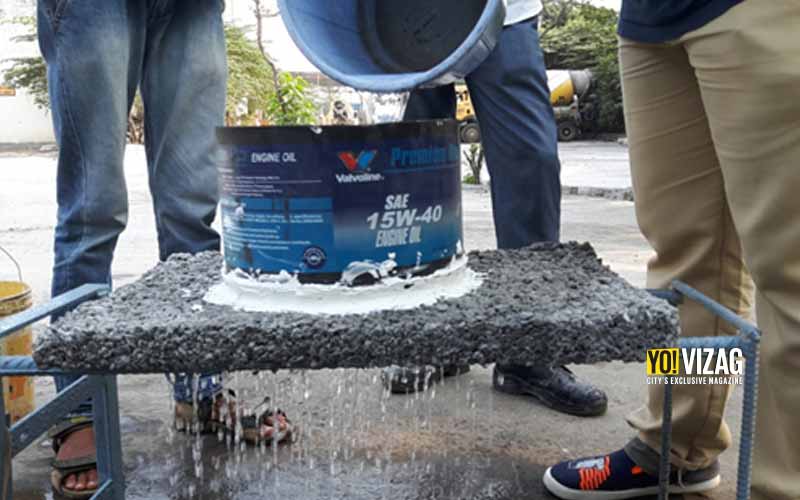



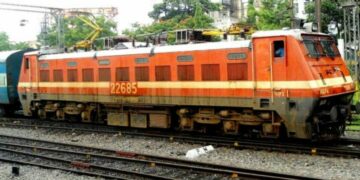
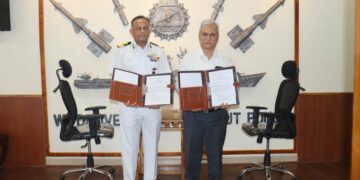


Discussion about this post